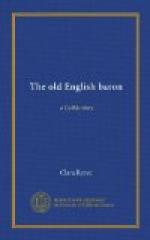“My friends,” said he, “this gentleman is Mr. Edward Seagrave, the son of a dear friend and relation of mine. He was lost in his infancy, brought up by a good woman out of pure humanity, and is but lately restored to his own family. The circumstances shall be made known hereafter; In the meantime, I have taken him under my care and protection, and will use all my power and interest to see him restored to his fortune, which is enjoyed by the usurper who was the cause of his expulsion, and the death of his parents. Receive him as my relation, and friend; Zadisky, do you embrace him first. Edmund, you and this gentleman must love each other for my sake; hereafter you will do it for your own.[”] They all rose; each embraced and congratulated the young man.
Zadisky said, “Sir, whatever griefs and misfortunes you may have endured, you may reckon them at an end, from the hour you are beloved and protected by Sir Philip Harclay.”
“I firmly believe it, sir,” replied Edmund; “and my heart enjoys, already, more happiness than I ever yet felt, and promises me all that I can wish in future; his friendship is the earnest Heaven gives me of its blessings hereafter.”
They sat down to supper with mutual cheerfulness; and Edmund enjoyed the repast with more satisfaction than he had felt a long time. Sir Philip saw his countenance brighten up, and looked on him with heart-felt pleasure.
“Every time I look on you,” said he, “reminds me of your father; you are the same person I loved twenty-three years ago—I rejoice to see you under my roof. Go to your repose early, and to-morrow we will consult farther.”
Edmund withdrew, and enjoyed a night of sweet undisturbed repose.
The next morning Edmund arose in perfect health and spirits: he waited on his benefactor. They were soon after joined by Zadisky, who shewed great attention and respect to the youth, and offered him his best services without reserve. Edmund accepted them with equal respect and modesty; and finding himself at ease, began to display his amiable qualities. They breakfasted together; afterwards, Sir Philip desired Edmund to walk out with him.
As soon as they were out of hearing, Sir Philip said, “I could not sleep last night for thinking of your affairs; I laid schemes for you, and rejected them again. We must lay our plan before we begin to act. What shall be done with this treacherous kinsman! this inhuman monster! this assassin of his nearest relation? I will risk my life and fortune to bring him to justice. Shall I go to court, and demand justice of the king? or shall I accuse him of the murder, and make him stand a public trial? If I treat him as a baron of the realm, he must be tried by his peers; if as a commoner, he must be tried at the county assize; but we must shew reason why he should be degraded from his title. Have you any thing to propose?”
“Nothing, sir; I have only to wish that it might be as private as possible, for the sake of my noble benefactor, the Lord Fitz-Owen, upon whom some part of the family disgrace would naturally fall; and that would be an ill return for all his kindness and generosity to me.”




